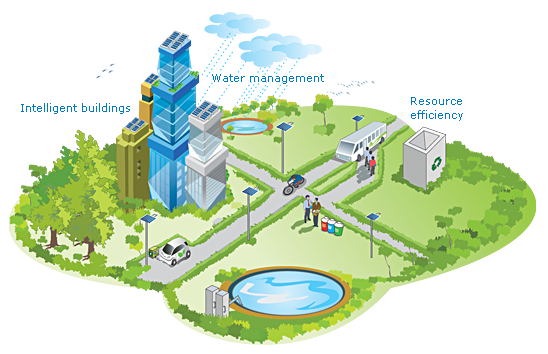 In 2008, a reputed confectionery
company based in the U.S.
reduced its carbon footprint by 20%.
The company's complex distribution network in
Western Europe covered more than 44 million
kilometers a year in shipments. Analyzing
shipment data and using it to modify logistic
operations helped the company evolve
business practices that cause least harm to the
environment.
In 2008, a reputed confectionery
company based in the U.S.
reduced its carbon footprint by 20%.
The company's complex distribution network in
Western Europe covered more than 44 million
kilometers a year in shipments. Analyzing
shipment data and using it to modify logistic
operations helped the company evolve
business practices that cause least harm to the
environment.
Can we afford to take sides today in the conflict
between global economic and global environmental
interests? It is beyond debate now that we must
invest in a sustainable tomorrow, in a world that is
threatened with extinction by its inhabitants recklessly
disturbing its unique and delicate balance.
Businesses have a significant impact on the
environment through their use of energy and other
environmental resources, and the emissions from
their operations. Society, in the form of markets,
governments, investors, the local community and
employees, demands demonstration of concern and
action from businesses. Hence, businesses have an
unwritten social contract to factor environment
as an important dimension of their operations
and products. At the same time, governments of
emerging economies and developing countries have
a responsibility towards their citizens to ensure that
environmental sustainability is achieved in a climate of
continued economic growth.
Rising costs and scarcity of energy and resources
impact long-term economic sustainability of
businesses, and are among the top pressures driving
their sustainability agenda. Improving energy efficiency
and reducing resource intensity is often the first and most important step toward achieving sustainability.
This is driving the focus around energy efficiency in
operations, transport, buildings, devices, equipment
and in harnessing alternate energy sources.
Technology is emerging as a key enabler in
managing resource usage and efficiency. We have
used technology to measure and monitor energy
consumption data at granular levels in our campuses.
Insights gained from analysis of this data enabled
focused initiatives resulting in a per capita saving of
10% in energy consumption and energy bills over the
last year.
Addressing issues of environmental sustenance and
resource conservation without impacting growth
calls for what can be termed as ‘green innovation’. Enterprises can drive their ‘go green’ goals through
innovations in IT, communications, engineering and in
materials and processes while also opening up newer
possibilities for growth. We use our technology and
innovation capabilities to offer solutions to clients
in areas such as Smart Grid, Intelligent Building
Design and Management, and Green Logistics, in
conjunction with partnerships and alliances that
bring complementary capabilities. Incidentally, it was
Infosys that provided the analytics solution that helped
the American confectionery company reduce its
carbon footprint. |